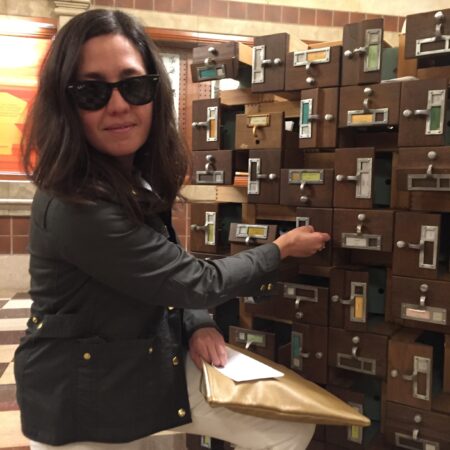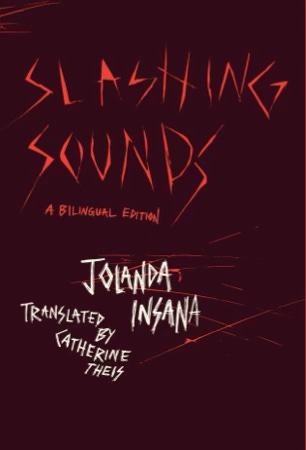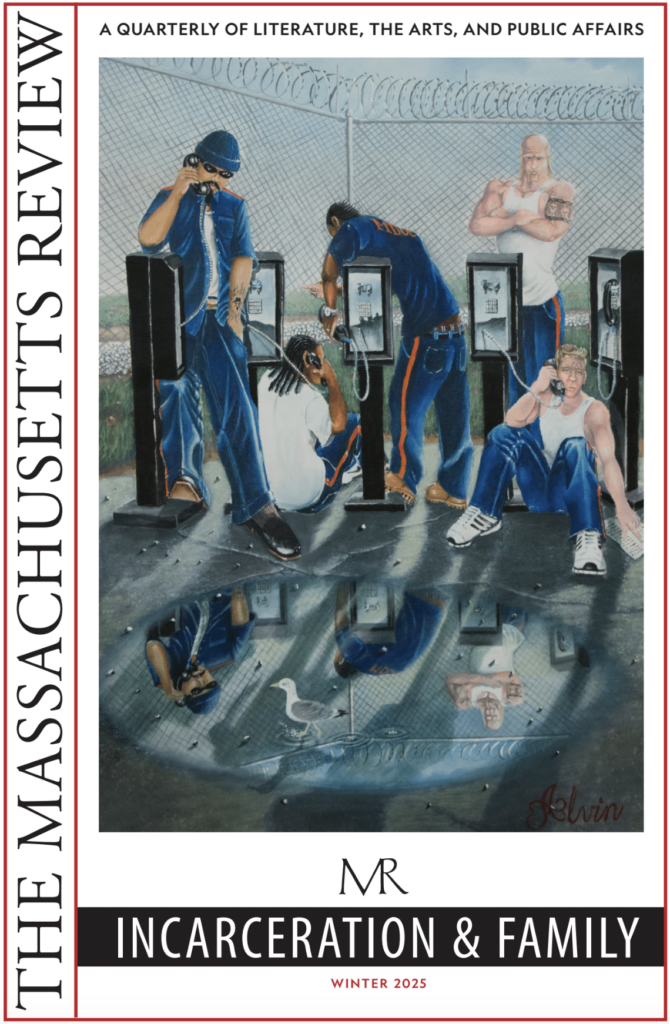10 Questions for Catherine Theis

1
I have a lot of references
more than enough
2
the reference is me
and I’m proud of it
3
I mirror me and lighten with pain
forming families of words
baby pictures and older little sisters
the mirror is me
it’s me my true self
and you deform us
—from Catherine Theis’ translation of Jolanda Insana’s “I Said Nothing,” Volume 65, Issue 3 (Fall 2024)
Tell us about one of the first pieces you translated.
Before I started translating Jolanda Insana, I worked on poems by Alda Merini and Laura Pugno. Both poets sometimes work in short forms, so I felt like I had a better shot of capturing the essence of what they were trying to do. What I soon realized, though, is that short poems are harder to translate! Everything must be just perfect, there’s no room for misbehaving. I think translating Virgil’s Aeneid in high school had a profound effect on me. I coasted through much of my high school Latin classes. But during senior year when we translated the epic, and I wasn’t really giving it my all, my teacher pulled me aside one day and told me I was going to fail the class if I didn’t take translating seriously. No teacher had ever said that to me before! I was equal parts offended and worried, but I started studying. In the end, nothing brought me greater joy than working with Virgil’s poetry. That experience was mirrored when I took a Dante course my senior year in college. There’s something very satisfying about translating a long poem. Insana’s poems are long, not epic long, but long enough to create real rhythm and interesting momentum.
What writer(s) or works have influenced the way you write now?
Oh my! There are so many. Gertrude Stein, Italo Calvino, Maurice Blanchot, Virgil, Hilda Doolittle, Dante, Walter Benjamin, Bruce Smith, Lauren Levin, Franz Kafka, Shakespeare, Buson, Federico Fellini, Picasso, Ed Roberson, Hope Mirrlees, John Keats, James Joyce, Jessica Savitz, Marjorie Perloff, Steven Aaron Minas, Roland Barthes, John Ashbery, Bashō, Barbara Guest, James Schuyler, Frank O’Hara, Lorca, Samuel Beckett, T.S. Eliot, Coleridge, Jared Stanley, Ovid, Virginia Woolf, Issa, Duchamp, Magritte, Anne Carson, Apollinaire, I just love Apollinaire….I think “Zone” and Eliot’s “The Waste Land” are my two favorite poems. I also love Robert Frost’s “Directive,” which is strange, and Elizabeth Bishop’s “Crusoe in England.” I love listening to old recordings of poets reciting their poems. John Berryman’s recordings are always great fun.
What other professions have you worked in?
I’ve worked in educational publishing, marketing, and in academia. I’ve also worked as a professional ticket-taker at three different places in my youth: at the beach, the movies, and Ravinia, a classical music festival in Highland Park, Illinois. The thrill of ticket collection is that you can join in the fun, too. If I wasn’t watching movies or listening to music, you probably could find me at the beach reading. My first full-time job after college was as an editorial assistant at McGraw-Hill’s Glencoe division. I helped put together readings for a series of books called The Literature Library that was often included when the English Language textbook was bought. I remember suggesting “The Hollow Men” by T.S. Eliot as a supplemental reading when the series reprinted Joseph Conrad’s Heart of Darkness. I shadowed a wonderful editor who showed me how to do everything—original research, editing, copyediting, rights & permissions. Then I went to get my MFA at the Iowa Writers’ Workshop. Afterwards, I ended up working in the marketing department of a very large corporation. My role was to ensure Brand Compliance across several divisions of the company. It was the perfect job for me: a steady paycheck, health benefits, and an easy train commute where I could work on my poems. I did that until I felt the call to go back and get my Ph.D. I had always wanted to get my doctorate, but I foolishly decided it wasn’t in the cards. I was wrong. I went back to school and haven’t looked back since. I now teach general education classes and poetry workshops to college students.
What did you want to be when you were young?
I always wanted to be writer. I mean, when I started college there was no question that I would declare English Literature as my major. I did take a lot of botany classes though, and dreamed of becoming a botanist, but literature was my calling. I wrote short stories, poems, plays, essays, I liked doing a little bit of everything. I still do. I had a feeling I was either going to be a writer or a lawyer. Or that ever popular combination of writer-lawyer, though that usually only happens with fiction writers. I’ve applied to law school a few times but decided not to pursue it.
What drew you to write a translation of this piece in particular?
I resonated with Insana’s rough and smart voice. I liked spotting the moments of corruption or distortion in her poems. “I Said Nothing” is the first poem in her book, Slashing Sounds. And I adore the way she introduces herself to her readers. I felt invited into her confession of negation. I also liked the texture of the poem; it has both Latin and Italian in it. Likewise, “An Old Pleasure” begins with a nod toward those lost souls in Dante’s Inferno. Allusion casts a magic spell on me, and I can’t help but be seduced by the various conversations happening all at once.
Is there a city or place, real or imagined, that influences your writing?
I love Southern California because it reminds me of Sicily. I love recollecting about Sicily because I spent half of my childhood there. Both places are not for the faint of heart. It’s difficult to live in Los Angeles, I think, so I appreciate all its “stabs of loveliness.” Sicily has the same thing going for it.
I also think Chicago appears in my poems: its lakeshore, greenery, and skyline, the edges of my childhood. I was close to my paternal grandparents and have lots of great memories from my adventures with them.
Is there any specific music that aids you through the writing or editing process?
Actually, I cannot listen to music when I write or translate. I need complete and utter silence. I adore a quiet house. It’s one of my favorite things. I adore a quiet car ride. I don’t even like the sound of an electric fan. My husband and I don’t argue about the temperature. We tussle over the speed setting of the fan.
Do you have any rituals or traditions that you do in order to write?
Oh god, yes! So, of course ….1) a quiet space. 2) lots of books around me. I feel better when I have piles of books at my fingertips. 3) and good food. I absolutely need to have good coffee and food. When I translated Insana, I took around two hours after lunch to sit at my desk and work. This was when our baby napped. Having a child is hard work but, in some ways, it really helps with my translation work because it also calls for a strict schedule. Sometimes I translated multiple stanzas, sometimes I did just three words. My ritual was to sit at my desk and not do anything else. No laundry, no cleaning, no emails, no Instagram—nothing but word weighing.
If you could work in another art form what would it be?
Of course, many poets wish they could be painters. But if I had to go back and do it all over again, I wish I had learned an instrument. That, to me, would be the top.
What are you working on currently?
I’m writing new poems into a manuscript called “News About Flowers,” the title which I stole from Karl Blossfeldt, a German photographer who photographed plants under magnification. But I’m also working on bringing to print a very wondrous collection of poems with a fantastic new publishing house, Antiphony.
CATHERINE THEIS is the author of the poetry collection The Fraud of Good Sleep and the play MEDEA. Slashing Sounds, her translation of the Italian poet Jolanda Insana, is forthcoming Fall 2024 from the University of Chicago Press’ Phoenix Poets series. She teaches at the University of Southern California.




